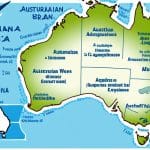Welcome to our ultimate guide on starting a travel business in Australia! If you’re passionate about travel and want to turn your passion into a business, this step-by-step guide is for you. Australia is a popular destination for both domestic and international travelers, and with the right strategies, you can tap into this lucrative market and create a successful travel business.
Starting a travel business might seem daunting, but with our expert advice, you can navigate the process with confidence. We’ll guide you through the essential steps, from understanding the travel industry to crafting a business plan, building your supplier network, and creating a strong brand identity.
Whether you’re interested in organizing tours, providing travel services, or offering unique experiences, our comprehensive guide will equip you with the knowledge and insights you need to succeed in the Australian travel industry. Let’s get started!
Key Takeaways:
- Starting a travel business in Australia requires thorough market research and understanding of the industry trends.
- A solid business plan is crucial for the success of your travel business, including financial projections and marketing strategies.
- Complying with legal and regulatory requirements is important to ensure your business operates within the legal framework.
- Building a reliable supplier network is essential to provide exceptional travel experiences to your customers.
- A strong marketing and branding strategy is vital to reach your target audience and establish a strong online presence.
Understanding the Travel Industry
Before diving into starting your travel business, it’s crucial to understand the travel industry in Australia. The travel industry, which encompasses various services such as transportation, accommodation, and tour packages, has been growing steadily over the past few years. In 2019, the industry’s total revenue amounted to £20.4 billion, with an estimated annual growth rate of 2.2%.
This growth can be attributed to several factors, including the rise of affordable air travel, increasing disposable income, and the popularity of experiential travel. These factors have influenced the travel preferences of consumers, who now seek unique and personalized travel experiences.
The Importance of Market Research
To identify opportunities and tailor your business offerings accordingly, conducting market research is essential. Market research involves collecting and analyzing data, such as consumer preferences, industry trends, and competitor activities.
Through market research, you can gain insights into your target audience, their needs, and the types of travel services that are in demand. This can help you develop a business strategy that aligns with the market’s needs and increases your chances of success.
Opportunities in the Travel Industry
There are several opportunities for individuals and businesses looking to enter the travel industry in Australia. According to a report by Tourism Research Australia, the domestic tourism market is expected to grow by 5.5% annually between 2019-2024, while the international inbound market is projected to grow by 3.8% annually over the same period.
Additionally, the rise of niche travel services, such as sustainable tourism and adventure travel, presents an opportunity for businesses that specialize in these areas. Understanding and catering to these emerging travel trends can help your business stand out in a crowded market and attract a loyal customer base.
“The world is a book, and those who do not travel read only one page.” – Saint Augustine
In conclusion, the travel industry in Australia offers numerous opportunities for new and existing businesses. Understanding the industry’s trends and consumer preferences through market research is essential for developing a successful business strategy. By catering to emerging travel trends and providing unique experiences, your travel business can thrive in the vibrant Australian market.
Crafting Your Business Plan
Starting a travel business is an exciting journey, but it requires careful planning and preparation. A comprehensive business plan will help you stay focused and on track towards achieving your business goals.
Define Your Services
The first step in creating your business plan is defining your travel services. Decide what types of services you will offer, such as airline tickets, accommodation bookings, tour packages, or customized travel experiences. It’s important to have a clear idea of your services, so you can target the right market and stand out from your competitors.
Outline Your Target Market
Identifying and understanding your target audience is crucial in creating a successful travel business. Define your ideal customer profile, such as their age, income, interests, and travel preferences. Analyze the current market trends and demand for various types of travel services to determine your target market’s specific needs and desires.
Develop Financial Projections
Creating financial projections is necessary to determine the feasibility of your travel business. Estimate your start-up costs, fixed and variable expenses, and potential revenue streams. Use these projections to determine your pricing strategy, profit margins, and break-even point. Remember to account for unexpected expenses and leave room for growth and expansion.
Strategize Your Marketing Approach
A well-planned marketing strategy will help you reach your target audience and build brand awareness. Determine the most effective marketing channels to reach your audience, such as social media, email marketing, search engine optimization, or paid advertising. Create a unique brand identity and messaging that aligns with your target market’s values and aspirations. Use your marketing budget wisely, measuring the effectiveness of each campaign and adjusting your strategy accordingly.
Visualize Your Business Plan
A visual representation of your business plan can help you and other stakeholders better understand your goals and strategies. Use a table to present your financial projections, outlining your start-up costs, revenue streams, and profit margins. Alternatively, use a timeline to visualize your marketing strategy and milestones. Remember to keep your visual aids clear and concise, avoiding too much complexity or unnecessary details.
With a solid business plan in place, you are well on your way to creating a successful travel business in Australia. Keep revisiting and reviewing your plan regularly, adapting to changes in the market and continuously improving your services and approach.
Legal and Regulatory Considerations
Starting a travel business in Australia involves complying with a range of legal and regulatory requirements. As with any business, ensuring that you are operating within the legal framework is crucial for avoiding penalties and legal complications.
One of the primary legal considerations is obtaining the necessary permits and licenses for your business. Depending on the nature of your travel business, you may require permits for conducting tours, providing transportation services, or operating a travel agency.
Additionally, insurance is a legal requirement for most travel businesses. This includes public liability insurance to cover any damages or injuries caused to third parties during your business operations.
Furthermore, in order to provide certain types of travel services such as adventure activities or wildlife tours, you may need to comply with specific regulations and obtain additional licenses.
Permits and Licenses
Obtaining the required permits and licenses can be a complex process, involving multiple levels of government and regulatory bodies. It’s essential to research and identify the specific permits and licenses required for your business and ensure that you obtain them before commencing operations.
Some key permits and licenses that may be required for your travel business include:
- Tour operator license
- Transport provider license
- Travel agent license
- Public liability insurance
- Activity-specific licenses (e.g., snorkelling tour license)
It’s important to note that permit and license requirements may vary depending on the state or territory in which you operate. For example, if you operate a tour business in New South Wales, you will need to obtain a Tourist and Services Vehicle Operator Accreditation.
Insurance
Insurance is a legal requirement for most travel businesses in Australia. Public liability insurance is particularly important as it covers your business for any damages or injuries caused to third parties during your operations. This type of insurance can protect your business from legal costs and compensation claims.
Other types of insurance that may be relevant for your travel business include:
- Professional indemnity insurance
- Workers’ compensation insurance
- Travel insurance (for customers)
It’s essential to seek professional advice to ensure that you have adequate insurance coverage for your business operations.
“Obtaining the necessary permits and insurance is a crucial step for starting a travel business in Australia. Failure to comply with legal requirements can lead to significant penalties and legal complications.”
Building Your Supplier Network
When it comes to providing exceptional travel experiences to your customers, building a reliable supplier network is crucial. Your suppliers will directly impact the quality of your offerings, which is why it’s essential to establish partnerships with the right ones. Here’s how:
Identifying Your Suppliers
Before you start reaching out to potential suppliers, it’s important to identify who you need to work with. You can start by researching suppliers that are relevant to your travel business. Here are some examples:
- Airlines
- Accommodation providers
- Tour operators
- Transportation companies
- Travel insurance providers
Once you’ve identified potential suppliers, evaluate their quality of service, reliability, and pricing. You want to partner with suppliers who share your vision for delivering exceptional experiences to your customers.
Negotiating with Your Suppliers
Once you’ve identified your ideal suppliers, it’s time to negotiate with them. Here are some tips to help you get the best deals:
- Be prepared: Do your research and come to the negotiation table with a solid understanding of your supplier’s pricing and their competitors’ pricing.
- Be personable: People enjoy doing business with people they like, so build a rapport with your supplier.
- Communicate your needs: Be clear about your requirements and expectations.
- Be willing to compromise: Negotiation is a two-way street. Be open to compromising on certain terms to secure a mutually beneficial partnership.
Creating and Maintaining Partnerships
Once you’ve established partnerships with your suppliers, it’s essential to maintain them. Here are some tips:
- Communicate regularly: Keep in touch with your suppliers to ensure a smooth working relationship.
- Provide feedback: Let your suppliers know what they’re doing well and where they can improve.
- Be loyal: Show your suppliers that you value their partnership by consistently working with them.
By building a reliable supplier network, you can provide exceptional travel experiences to your customers and establish a strong reputation in the travel industry. Remember to form partnerships based on mutual goals and values, negotiate effectively, and maintain your relationships for long-term success.
Marketing and Branding Strategies
Creating a strong brand identity and implementing an effective marketing strategy is crucial for the success of any travel business in Australia. Your branding should represent your company’s values, voice, and unique selling points. Here are some tips to boost your marketing and branding:
Create a Unique Brand Identity
Your brand identity is what sets you apart from your competitors. It encompasses your logo, colour palette, typography, tone of voice, and overall aesthetic. Your branding should reflect your company’s personality and values and appeal to your target audience. Don’t be afraid to inject some creativity and personality into your brand identity. Make it memorable, and it will help you stand out in the crowded travel industry.
Establish a Strong Online Presence
In today’s digital age, having a strong online presence is more important than ever. Your website should be user-friendly, visually engaging, and optimized for search engines. Utilize social media platforms such as Facebook, Instagram, and Twitter to engage with your audience and showcase your brand personality. Create valuable content, such as blog posts and travel guides, to establish yourself as an industry expert and attract potential customers.
Utilize Various Marketing Channels
There are numerous marketing channels available to reach your target audience effectively. Paid digital advertising, such as Google AdWords and Facebook Ads, can help you advertise your travel services to a broad audience. Content marketing, such as email newsletters and blog posts, can help you engage with your customers and establish a relationship with them. Finally, affiliate marketing and influencer partnerships can help you reach a wider audience and increase your brand’s visibility.
Conclusion
Thank you for reading our ultimate guide on how to start a travel business in Australia. We hope that you found the information helpful and insightful. Starting your own business can be a challenging but rewarding experience, and the travel industry in Australia offers plenty of opportunities for entrepreneurs.
Remember that success in any business requires commitment, hard work, and continuous learning. Keep refining your business plan, stay up-to-date with industry trends, and be open to feedback from customers and partners. With dedication and perseverance, your travel business can thrive in the dynamic Australian market.
Wishing You The Best of Luck!
We wish you the best of luck in your entrepreneurial journey and hope that our guide has been a valuable resource for you. If you have any questions or feedback, feel free to reach out to us. We would love to hear from you.
FAQ
How long does it take to start a travel business in Australia?
The timeline for starting a travel business can vary depending on several factors, such as the complexity of your business plan, the time it takes to obtain necessary permits and licenses, and the establishment of your supplier network. On average, it can take several months to a year to fully set up and launch your travel business.
Do I need any specific qualifications or certifications to start a travel business?
While specific qualifications or certifications are not mandatory to start a travel business in Australia, having relevant experience and knowledge in the travel industry is highly beneficial. Additionally, certain niche areas, such as offering specialized tours or becoming a registered travel agent, may require specific qualifications or certifications. It’s essential to research and understand any industry-specific requirements for your chosen business model.
How can I differentiate my travel business from competitors?
To stand out from competitors, focus on providing unique experiences, personalized services, and exceptional customer service. Differentiating factors could include offering niche tours or packages, creating exclusive partnerships with local suppliers, or providing customized itineraries tailored to individual preferences. Additionally, investing in strong branding and marketing strategies will help showcase your business’s unique value proposition to your target audience.
How can I attract customers to my travel business?
An effective marketing strategy is crucial to attract customers to your travel business. Utilize various channels, such as social media, online advertising, content marketing, and search engine optimization (SEO), to reach and engage your target audience. Additionally, building relationships with travel agents, attending travel trade shows, and offering incentives or promotions can help attract customers. Providing exceptional customer experiences and encouraging positive reviews and referrals will also contribute to attracting new customers.
What are the common challenges faced by travel businesses in Australia?
Some common challenges faced by travel businesses in Australia include seasonality, competition, changing consumer preferences, and external factors such as global economic conditions or natural disasters. It’s important to conduct thorough market research, adapt to industry trends, and continually innovate to overcome these challenges. Building a strong network of suppliers and developing a loyal customer base can help mitigate some of these challenges and ensure the long-term success of your business.





















